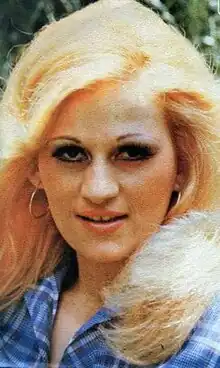Dina Bajraktarević
Hajrudina Bajraktarević Nikolić (born 19 March 1953), known professionally as Dina Bajraktarević, is a Bosnian former singer and the younger sister of Silvana Armenulić and Mirjana Bajraktarević. Both of her sisters died in a car crash in 1976.[1]
Dina Bajraktarević | |
|---|---|
 | |
| Born | Hajrudina Bajraktarević 19 March 1953 |
| Occupation |
|
| Years active | 1977–87 |
| Musical career | |
| Genres | |
| Instrument(s) |
|
| Labels | |
Early life and family
Hajrudina Bajraktarević was born in Doboj, PR Bosnia and Herzegovina, FPR Yugoslavia to a Muslim and ethnically Bosniak family with thirteen children. Her father was Mehmed Bajraktarević (1909–1966), owner of a local cake shop called Jagoda (Strawberry), and her mother was Hajrija (1916–2008).[2][3][4] Hajrudina's sister Silvana (born Zilha) started singing at an early age, but their father, a local cake shop operator, was not supportive of her singing career.[5][6]
Dina had a brother named Hajrudin who died about two weeks after being mauled by a dog in the 1940s. After her brothers death, her father found solace in alcohol and solitude, neglecting the family and his business. After her father's cake shop closed, the family suffered greatly. The family of thirteen children included sisters Hajrudina, Zilha (Silvana), Abida, Mirsada and Ševka, and brothers Hajrudin, Muhamed, Izudin, Abudin, and Ismet. Her oldest sister Ševka's son Sabahudin Bilalović became a professional basketball player who died aged 43 of a heart attack on the beach while swimming with his son. Ten years later, Ševka and her husband Lutvo both died of natural causes in September 2013, just days apart.
In 1955, Silvana moved to Sarajevo at the age of sixteen where she lived with her aunt and sang in local kafanas for money. She eventually landed a professional singing career which led way to sister Mirsada getting a record deal and recording her first album at the age of eighteen in 1969 and releasing it in 1970.
The singing sisters, Silvana and Mirsada, died together in a car crash on 10 October 1976 near the Serbian village Kolari. At the time, Mirsada, who was in the second term of her pregnancy, was sharing an apartment with Dina.
Career
After her sisters deaths, Dina was approached to release an album. Hesitant to sing professionally at first, she ended up releasing three extended plays: one in 1978, 1979 and 1980. She had major success with the song "Sudbina je tako htjela" (Fate Wanted It That Way). She then took a break from music and had two sons, Silvano and Silvan, with her husband singer Žika Nikolić.[7] Their sons Silvano and Silvan, named after Dina's late sister Silvana, are singers as well, although Silvano is not singing actively anymore, whilst Silvan is taking music to a professional level with his voice.
Bajraktarević made a return to music in 1987 with a full-length studio album, Dođi dragi ne dangubi (Come Dear, Do Not Waste Time). That was her final release before retiring from music.
Later life
During the Bosnian War of the 1990s, Dina, together with her husband, sons and mother Hajrija fled their home in Doboj for Denmark. Mother Hajrija lived to the age of 91, dying in 2008.[8] Five years after their mothers' death, Dina's oldest sister Ševka died on 30 September 2013 in Trebinje at the age of 79, leaving Dina the last living of the female Bajraktarević children.
Discography
During her short career, Bajraktarević released three extended plays and one studio album:
| Tracks | Released |
|---|---|
Ja na tugu nemam prava / Sudbina je tako htjela[9]
|
1978 |
Ti nikada nisi bio sam / Srce si mi zapalio[10]
|
1979 |
Neću laži, hoću istinu
|
1980 |
Dođi dragi ne dangubi[11]
|
1987 |
See also
References
- "Dina Bajraktarević Discography". discogs. Retrieved 1 September 2012.
- "NEPOZNATI DETALJI IZ ŽIVOTA SLAVNE SILVANE ARMENULIĆ". Aua. 12 January 2015. Archived from the original on 4 April 2015. Retrieved 17 January 2015.
- "Sjecanje na Mirjanu Bajraktarevic 1 dio". 2006. Retrieved 19 October 2012 – via YouTube.
- "Hajrija Barjaktarević apartman". glas-javnosti. Retrieved 19 October 2012.
- "Tražio zaplenu imovine Šabana Šaulića | Glas javnosti". Glas-javnosti.rs. Retrieved 25 May 2012.
- "Mirsada Mirjana Bajraktarević (1951–1976)". Riznicasrpska.net. 15 October 2007. Retrieved 25 May 2012.
- "Žika Nikolić Discography". discogs. Retrieved 1 September 2012.
- "Tražio zaplenu imovine Šabana Šaulića | Glas javnosti". Glas-javnosti. Retrieved 1 September 2012.
- "Dina Bajraktarević – Ja na tugu nemam prava / Sudbina je tako htjela (Vinyl)". discogs. 1978. Retrieved 1 September 2012.
- "Dina Bajraktarević – Ti nikada nisi bio sam / Srce si mi zapalio (Vinyl)". discogs. 1979. Retrieved 1 September 2012.
- "IODA: Independent Online Distribution Alliance". Iodalliance. 1987. Archived from the original on 9 April 2013. Retrieved 1 September 2012.
External links
- Dina Bajraktarević discography at Discogs
- Dina Bajraktarević Nikolić on Facebook